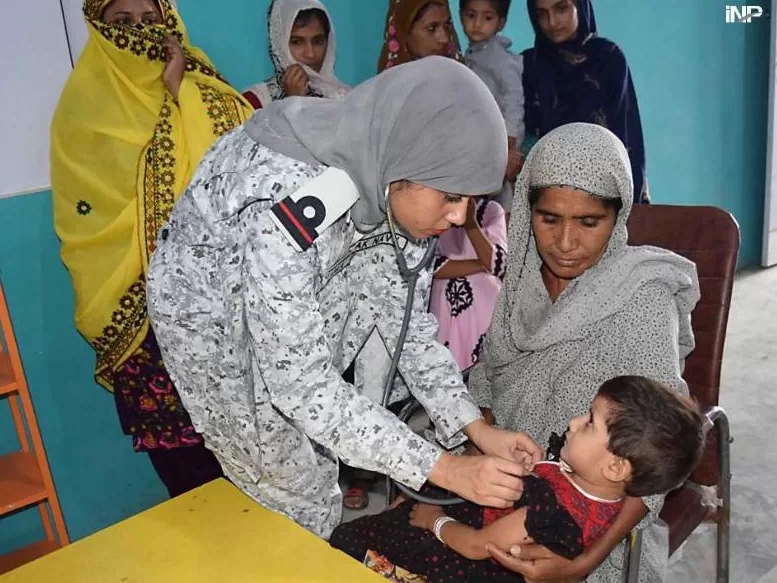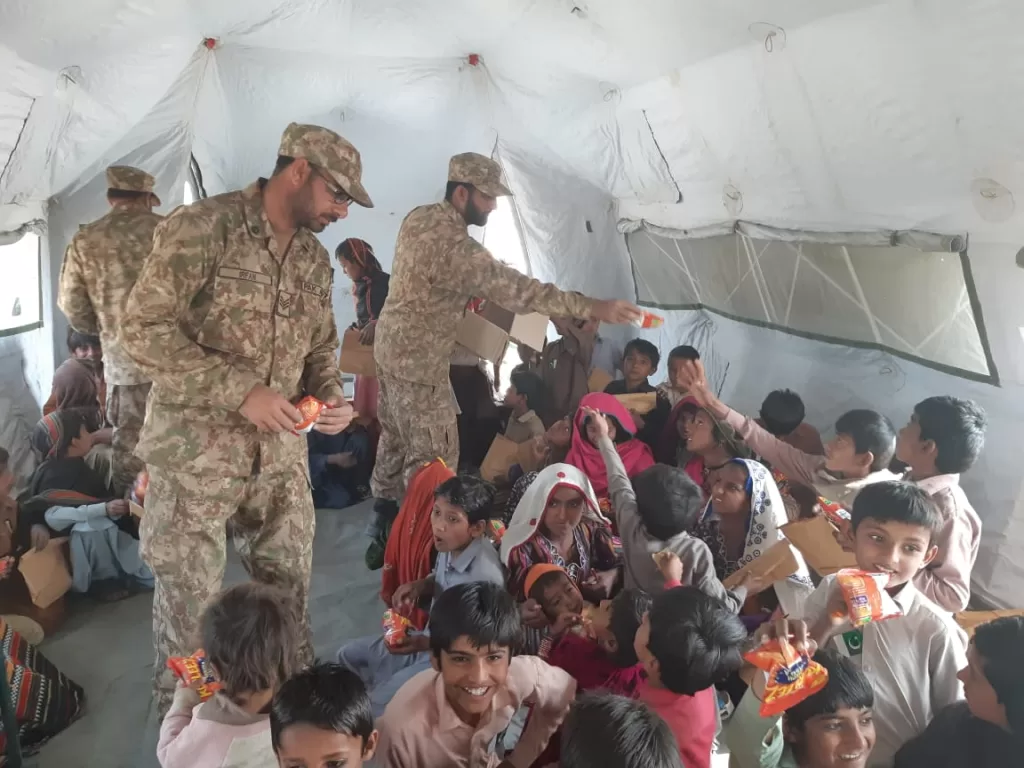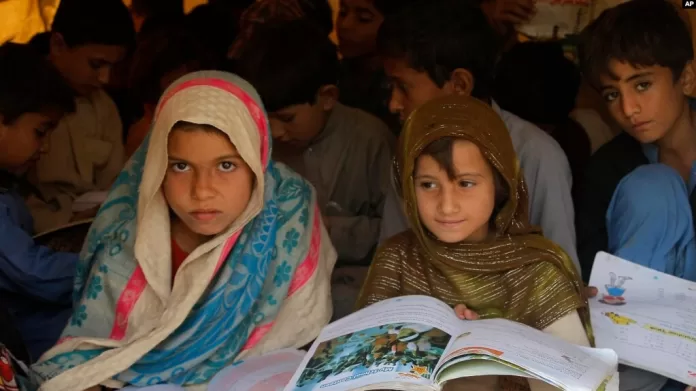Children are a priceless gift of Almighty Allah and are the most important aspect of life for parents. Nourishment and upbringing of children is an important responsibility of parents as such parenting is challenging task that requires patience and perseverance. Apart from other factors, environment plays a pivotal role on the behaviour of the children. Addition of military life makes it an altogether different playing field1.
Children living living in military environment are different from their civilian counterparts in many ways They live in secure and secluded environment of military cantonments, they study in purposely built schools, they receive medical treatment in military hospitals and they have better opportunities for extracurricular activities as most military housing schemes and cantonments are equipped with sports facilities, club activities, liberaries etc. They also have opportunities to attend social functions with their parents.
Generally, it is considered that children growing up within military environment have an advantage over their civilian counterparts. They grow up in a diversified environment and learn how to be flexible, make friends and be open-minded about other cultures and lifestyles. They have better leadership qualities, good written and verbal expression and they learn manners and etiquettes of official gatherings.
Despite many benefits, another pecularity of military environment is uncertaininty in working hours of serving father due to long office hours, exercises, inspections, deployments and good will cruises. Frequent relocation due transfers, postings, courses and deputations is another factor which affects the life of miltary children. Similarlry, being separate from the general public, generally they do not under- stand the ups and downs of life as compared to the civilan children living in the suburbs and studying in government schools. According to psychologists, all these factors are to be catered for better nourishment and upbringing of military children.
Military children face absence of their fathers for long periods. Children who do not live long with their father generally remain unconfident and some times develop an introvert personality.
It is therefore required whenever you find time, dedicate most of your time to family so that they should learn the balance in professional and family life and importance of relationships. You may think about ta taking them out with you and try to learn about their interests, hobbies and preferences. Playing with children, helping them do homework, gardening with them all are good activites to remain engaged with them. Similary, it is also necessary to take them along on family functions such as wed- dings, other social gatherings and funerals as well. These will give them opportunity to learn the importance of relationsship in the life and they will develop better social and inter personal skills.

Experts in military medicine and family trauma who understand the impact of deployment on families have identified2 that while deployments are stressful, they also pro- vide opportunities for families to grow closer and stronger. The best way to help children cope is to reassure them that the deployed parent is trained to do his job as many children are worried about the safety of their parents. One very positive way is emphasize to children that they have a job that is as real as that of the deployed parent, which is to take care of themselves and home affairs. Stress is often the result of feeling helpless or unclear about a new role or situation. It is important to reinforce that doing well in school, helping out at home and being cooperative is a skill set that is part of their job, one that is valued and unique to their being a military child. When children do their job they help support their parent’s mission. If there is concern about a child’s behavior at home, parents should notify the school. Many parents may be reluctant to call attention to their child by warning school officials, but it is important for the school to be alert to any unusual symptoms. It is important to talk to your child about any acting out, and get them to discuss their feelings and issues. Be careful about sharing your emotions with children. Some parents share too much (losing control in front of kids) or share too little (no emotion or giving the message that you can’t talk about it). Children take their cues from you. Here are some tips for family readiness for deployments:
– Keep up the routine. Activities, such as games, schooling, bed times, are important to keep regular. Continue to celebrate birthdays or other special occasions with enthusiasm.
-Help your children create scrapbooks, video or journals to send or share upon return.
-Listen to your children and their concerns. Children may think a lot and have worries/concerns about their parents that are difficult to express. Be available when they are ready to communicate.
-Limit television and other media coverage of terrorism to help reduce anxiety and worries.
Having seen the absence of fathers due deployments, another factor in the lives of military children is frequent relocation. If we compare military and civilian families, civilian family may move once or twice in a 25 year period, whereas military families relocate every three to four years, hence the military children have to change their friends, neighbours, class fellows, teacher and also school. When we think about stress in children’s lives, moving to another neighborhood is not the first thing that comes to mind. But changing homes, schools, and friends can be very stressful for the children.
Some children embrace moving as an opportunity to make new friends and to learn new things; others get anxious or develop behavior problems. It may take children and adults months to move3. For many adjust after a move children and adolescents, giving up the familiar friends, favorite places, and routines can be difficult. As parents focus on coordinating the moving process, some children react negatively to the decrease in attention. Children may experience anxiety and grief before, during, and after a move, and these emotions are intensified if moving results from major family disruptions, such as divorce or death. Easing the transition to a new home is important for children.
Here are some tips for reducing stress on children during transition4.
- You should be prepared to pro- vide specific information about how you intend to help them nurture their continued relationships with important family members and friends. Be particularly intentional about letting your children know that you’ve given a lot of thought already to how you’re going to help them keep in touch with loved ones.
- Consider allowing your children to use email, instant messaging, or social media to stay in touch with their friends. If they are old enough to use these types of social technologies, and they show an interest in communicating with their friends in this way, it can help to temper the blow of moving to some extent. Although it’s not going to make them feel 100% better, but being able to imagine how they’re going to stay in touch can help your kids as they begin to absorb the transition.
One of the things that you can do to help your kids adjust to the idea of moving is to help them visualize as much as they can about the new location. For example, be pre- pared to share ideas about how they might decorate their new If rooms. your kids will experience clear benefits to moving, such as having their own bedrooms for the first time ever, share those details, too. too. The more you can help your kids “see” themselves in the new location, the less anxious they will feel about the concept.

The importance of good-byes can not be understated. When the time is right, talk with your children about how they would like to say good-bye to their closest friends. If possible, consider hosting an event in your home where they can invite their friends to gather and celebrate the times they’ve spent together, or create a scrapbook your kids’ friends can all sign. Letting your kids know that you’ve given their need to say good-bye considerable thought is another way to show your consideration for the impact that moving will have on them.
Give them space to process their feelings and get used to the idea. One thing that can be especially helpful is giving each child a journal to write about how moving makes them feel and promise not to read it unless they choose to share it with you. It’s okay for your children to feel differently about moving than you do, and allowing them to have those feelings will help them come to a point of acceptance and even, potentially, see the good in your impending move.
Whenever childeren go to a new place everything is new for them so it is necessary for the parents to help the children in settling to a new atmosphere. Frequent visits to school will help the children to get settled quickly. Similarly, you may take them out on excursions in your new city so that they get attracted to the new place and remain engaged. After relocation involve them in set- ting up your house.
If mother and father both are working, this will further complicate the life of the children. It is important to celebrate your own and their achievements so that they under- stand the importance of happiness and joy in the life.
To sum up, human personality is complex and it is highly dependent upon parenting and environment aprt from other factors. Being in military environment, children face some challenges in upbringing. There is a need to help children to overcome these challenges to make them better human beings and good citizens.◆
End Notes
1. Jennifer Greene, Parenting: Military style, June 22, 2009. http://www.white- man.af.mil/news/story.asp?id=123159860
2. Helping Children Cope During Deployment Courage to Care, http://www.usuhs.mil/psy/CTChildren Cope During Deployment.pdf
3. Samhsa, The Six Steps to Take When Moving: Easing the Transition For Children. http://parentingteens.about.com/od/f amilylife/a/moving.htm
4. Jennifer Wolf, 10 Tips for Telling Your Kids “We’re Moving” How to Prepare Yourself to Give Your Children Moving News http://singleparents.about.com/od/communicatingwiththekids/tp/children_mov- ing_tips.htm




